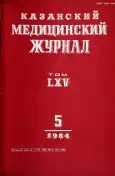О патогенетической терапиихронического пиелонефрита после цистэктомии
- Авторы: Ситдыков Э.Н.1, Ситдыкова М.Э.1, Зубков А.Ю.1
-
Учреждения:
- Казанский ордена Трудового Красного Знамени медицинский институт имени С. В. Куратова
- Выпуск: Том 65, № 5 (1984)
- Страницы: 342-344
- Тип: Теоретическая и клиническая медицина
- URL: https://bakhtiniada.ru/kazanmedj/article/view/89399
- DOI: https://doi.org/10.17816/kazmj89399
- ID: 89399
Цитировать
Полный текст
Аннотация
Лечение хронического пиелонефрита после цистэктомии является сложной и нерешенной проблемой. Ее трудность заключается в том, что, во-первых, независимо от способов отведения мочи у всех больных после цистэктомии развиваются уроди- намические нарушения верхних мочевых путей, которые, являясь основным патогенетическим фактором вторичного хронического пиелонефрита, способствуют его возникновению и дальнейшему прогрессированию. Во-вторых, у большинства больных, подвергающихся операции удаления мочевого пузыря по поводу злокачественных новообразований, имеется вторичный хронический пиелонефрит. В-третьих, этиотропное лечение хронического пиелонефрита без восстановления нарушенной уродинамики мочевых путей оказывается малоэффективным и не предупреждает прогрессирования патологического процесса. Этим объясняется высокая летальность от хронической почечной недостаточности у больных, благополучно перенесших цистэктомию.
Ключевые слова
Полный текст
Открыть статью на сайте журналаОб авторах
Э. Н. Ситдыков
Казанский ордена Трудового Красного Знамени медицинский институт имени С. В. Куратова
Автор, ответственный за переписку.
Email: info@eco-vector.com
Кафедра урологии
Россия, КазаньМ. Э. Ситдыкова
Казанский ордена Трудового Красного Знамени медицинский институт имени С. В. Куратова
Email: info@eco-vector.com
Кафедра урологии
Россия, КазаньА. Ю. Зубков
Казанский ордена Трудового Красного Знамени медицинский институт имени С. В. Куратова
Email: info@eco-vector.com
Кафедра урологии
Россия, КазаньСписок литературы
Дополнительные файлы





